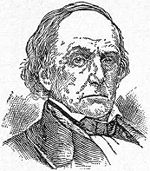sentiment during the war of liberation. His best opera, Der Freischütz (The Archer), was produced in 1822 at Berlin, and created a great sensation throughout Europe, so that Charles Kemble asked him for an opera for the English stage. Oberon was written in answer to this request, and brought out under his own direction at London in 1826, where he was greeted with enthusiastic applause. He died while on this visit to England, June 5, 1826. Consult Life by his son, translated by Simson.
Weber, Wilhelm Eduard, who has been called the Nestor of German physicists, was born at Wittenberg on the 24th of October, 1804. At the suggestion of Gauss he was appointed professor of physics at the University of Göttingen; but in 1837 he was compelled to resign on account of antagonism to the state authorities. Living for the next six years as a private citizen, he was in 1843 appointed to the chair of physics in the University of Leipsic; but he was recalled to his old post in Göttingen in 1849. The volume on The Theory of Waves (Wellenlehre), which he published with his brother, E. H. Weber, in 1825, is the first scholarly, experimental treatment of water-waves in existence. But perhaps Weber's chief service to science was the introduction of the absolute system of units into physical measurement — a work which he performed conjointly with Gauss. The invention of the earth-inductor and of the electrodynamometer is also due to Weber. As early as 1833 Gauss and Weber had connected the observatory and physical laboratory at Göttingen by means of a telegraph line. Weber died at Göttingen, June 23, 1891.
Web'ster, Mass., a town, embracing a group of villages in Worcester County, on the French River and on the Boston and Albany, and the New York, New Haven and Hartford Railroads, 16 miles south-southwest of Worcester. Incorporated in 1832, the town owns and operates its local waterworks, and, besides its municipal buildings, has a public library, together with good schools and attractive churches. Its chief industries, in addition to those connected with the railroads, embrace cotton and woolen mills, shoe-shops etc. It also has several newspapers, a national bank, a number of hotels; there is, moreover, a lake of 1,200 acres in extent in the neighborhood. Population 11,509.
Webster, Daniel. In January, 1830, an event of historical significance occurred in the United States senate. “Black Dan” Webster, senator from Massachusetts, delivered a speech that made him the Nestor of American orators in the golden age of American oratory. It was made in reply to a speech by Senator Hayne of South Carolina, who had declared that the Federal government was but a loose confederation of sovereign states and that the states could refuse to obey laws of Congress. Webster and President Jackson, who was at odds with his own party on this question, saw the dangers of this doctrine of nullification and joined hands across party lines in patriotic determination to stamp it out.

|
| DANIEL WEBSTER |
Webster rose to speak to packed galleries. In appearance he was grave and dignified, with the noblest head America has produced. He was smooth-shaven, heavy-featured, with swarthy skin, brilliant eyes and beetling brows. His rich voice had the range and melody of a chime of bells. The simplest man could follow his plain diction, while his logic and weight of argument delighted and convinced the most learned. He showed clearly that the doctrine of nullification could lead, logically, only to disruption and civil war. The speech was a defense of the Federal constitution and an appeal to national patriotism. It lifted the whole question of states' rights from the plane of a political theory to that of national ethics. One who heard it said: “That is the greatest oration since Demosthenes' On the Crown.”
The man who made it was born on Jan. 18, 1782, at Salisbury, N. H. How often, in reading the lives of great men, do we find them so frail in childhood that it was not thought probable they would live to maturity! Daniel was so delicate that he was the only member of a pioneer family who was exempt from hard labor. His mother, a woman of uncommon intellect and force, early discovered the boy's remarkable mental powers, taught him all she knew and insisted upon his entering the local academy. When he was 15 it was decided at a family conference, that he must go to college, no matter at what cost of toil and self-denial of the others. The sensitive boy burst into tears at this proof of devotion and confidence in his ability. In order to repay it, in part, when he graduated from Dartmouth College, he taught in an academy in order to send his brother, Ezekiel, to college. When admitted to the Boston bar in 1805, he located in the small town of Boscawen, N. H., in order to be near his father, who died a year later. Returning to Boston, he established a good practice, only to turn it over to his brother and to begin again in Portsmouth. American history records no finer example of family affection and loyalty than is furnished by the Websters. “Black Dan's” loyalty was wide as well as deep. In a Fourth of July oration, delivered at the age of 18, he made
